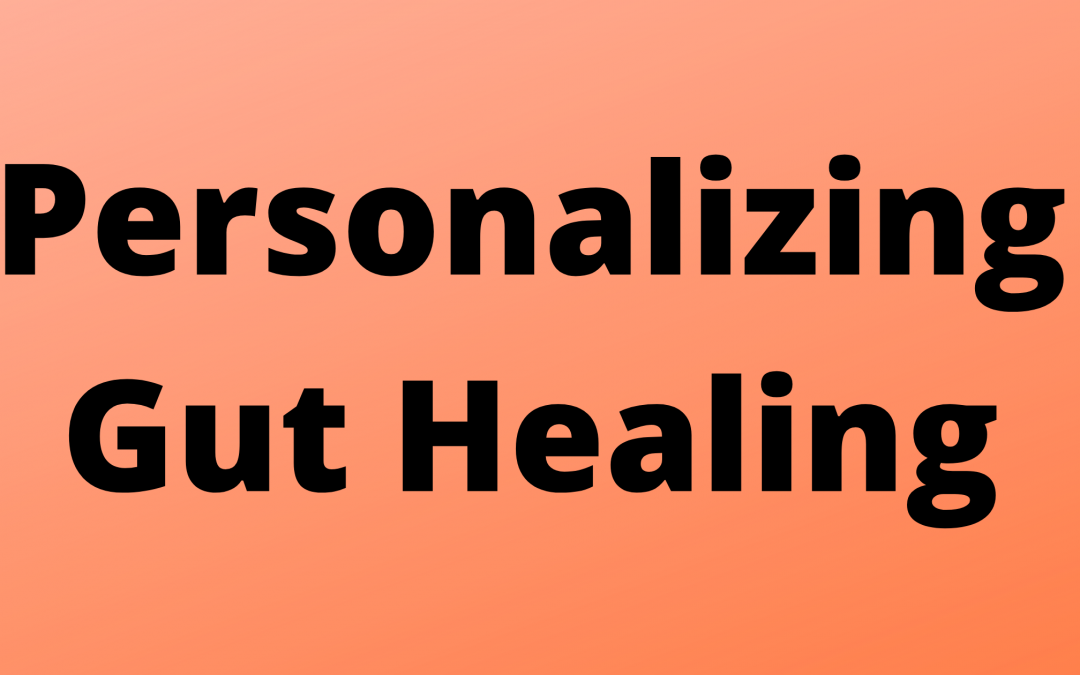Have you tried to follow a healing protocol from a book only to feel like you need more support and direction? Many of our clients tell us this.
While we’re grateful for the spread of much needed functional medicine information, sometimes information without direction can be paralyzing.
Today, there is so much information available and much of it is conflicting. How can you know what will work for your unique body and physiology?
Should you be keto, eat an autoimmune paleo diet, or be plant-based or vegan? What is a good diet for your condition, or your overall health?
We find the biggest pitfall from do-it-yourself healing is the lack of personalization of the guidance you may be following.
Gut Health
Core to functional medicine healing is gut health, so let’s talk about the need for personalization of your gut health care.
First, let’s take a step back and review what’s going on in a healthy gut versus an inflamed or leaky gut (intestinal permeability).
A healthy gut is without inflammation from inflammatory foods, additives, toxins, certain viruses, or an imbalance of bacteria. A healthy gut has a good balance of bacteria coating and protecting the single-cell layer (the Microbiome). Those bacteria have plenty of fiber and plants to eat in order to thrive and to secrete a mucous protection layer of short-chain fatty acids (SCFA). Because the cells are healthy, the tiny microvilli on the top of each cell are intact and working well to absorb nutrients.
A leaky gut has inflammation or too much “bad” bacteria (or not enough good bacteria to crowd those bad bacteria out) that are secreting toxins called lipopolysaccharides which break down the junctions holding the cells together. Larger food particles get in, showing themselves to the underlying immune system. The immune system recognizes these large particles as foreign and sets up its response system.
We have to heal the gut to reverse food sensitivities. (different from true food allergies).
So if you’re following a diet that only allows you to eat 10 foods to feel great, that’s a problem. It means that your gut has not healed and that you likely need more investigation of what is going on in your gut.
We take a look at this by listening to your story and in-depth functional stool testing.
Your Microbiome (balance of bacteria, yeast, viruses) is as unique as a fingerprint, so blanket statements without personalization like, “everyone should take probiotics, or everyone should be on a certain diet” can cause more harm than good.
Here are a few examples of a need for personalization:
- While probiotics can be very good for some people, especially after being on antibiotics, sometimes too much of a good thing can backfire. Drinking and eating probiotic foods can also lead to too much bacteria in the first part of the intestine, a condition called SIBO (small intestinal bacterial overgrowth). This can lead to bloating and stomach discomfort with eating, inflammation in the gut, IBS symptoms, and the feeling of brain fog.
- Also, many people have yeast overgrowth in their gut. For them, drinking Kombucha, although marketed as probiotics, may worsen their problem. People with yeast overgrowth should be avoiding fermented and yeasted foods.
- Another example, many people with gut inflammation have a histamine intolerance and are unable to break down histamine from foods. Foods that may be good for the gut for some like avocados, spinach, and some tree nuts, may cause allergic-like symptoms in others.
- Taking over the counter supplements and medications may have additives and food dyes that are harmful to your gut. We find many people are sensitive to these dyes that cause an inflammatory reaction in the gut which is then circulated through the body.
We see many diets that are marketed as good for the gut end up causing an aftermath of problems when they are not personalized. In our practice, we have seen the autoimmune paleo diet (AIP) be very effective at reducing symptoms for people, but it should be guided and personalized. Over-restrictions of foods commonly lead to micronutrient deficiencies (nutrients that are also helpful in maintaining a healthy gut!) and lack of fiber. Fiber itself is anti-inflammatory and detoxifying.
Being too rigid with your diet and lifestyle may actually be worse for your health if you are not getting the nutrients and fiber that you need.
In addition, stressing out about every food that you eat will cause your cortisol levels to spike, creating another host of health issues, along with preventing your gut from full healing. We find that worrying about what you will be able to eat can be a significant stressor for people.
At Connor Wellness Clinic, we’re here to support you through your healing and to sort through and personalize the information you may have been reading. We can test, and not guess what’s going on in your gut. The timeline we see for gut healing is usually between 3 and 6 months but can be longer for more complicated cases. This is why we see clients over a time period instead of just one visit. We truly want to see you succeed.
References:
Fasano, A. Zonulin, regulation of tight junctions, and autoimmune diseases. Ann NY Acad Sci 2013 July 1.



